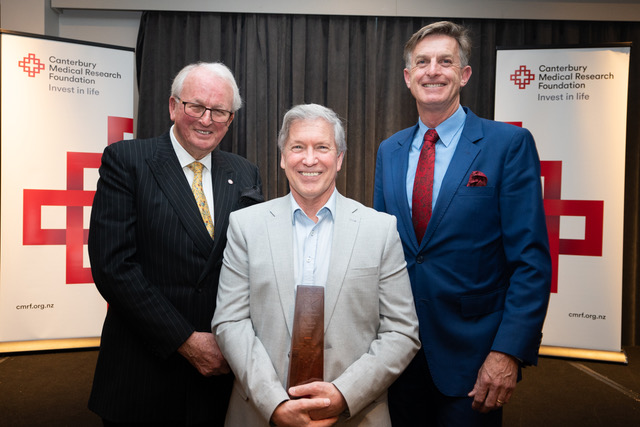
Professor Mark Richards was presented with the award at a ceremony on Thursday night.
CMRF board chairman Geoff Cranko said the award recognises the high level of health research undertaken in Canterbury by outstanding practitioners.
The CMRF invests in researchers like Richards to improve health outcomes through research to prevent, treat and ultimately cure life threatening and debilitating conditions, such as cancer, heart disease, bowel disease and neurological disorders.
Cranko said Richards was selected because of the global impact of his work and his long-standing excellence in leadership and mentoring in Canterbury.
Richards is a pioneer in the field of cardiac research and foundation member and long-time leader of the Christchurch Heart Institute.
Under Richard’s leadership the CHI has changed the way heart failure is treated here in New Zealand and internationally over more than three decades.
“The CHI is a world leader in the development of diagnostic tests, treatments and the understanding of risk factors for heart disease," Cranko said.

The group, which is directed by Richards, led a concerted research programme to understand the hormone’s usefulness as a way to diagnose heart failure and as an indicator of a patient’s likely outcome.
A NT-proBNP-based test is now the most widely-used test for heart failure globally.
Richards and the CHI, which is based at the University of Otago’s Christchurch campus, continue discover and implement new blood tests for heart disease, diagnosis and treatment.
Because of Richard’s clinical expertise and leadership in the field of cardiology, CHI discoveries have been clinically implemented, Cranko said.

About a decade ago, the National University of Singapore invited Richards to establish the Cardiovascular Research Institute of Singapore. He remains a joint professor at both the Universities of Otago and Singapore.
Richard’s recent work has focused on the characteristics of heart failure patients from different countries and ethnicities to understand how to better manage the condition in different populations and improve outcomes.
CHI Professor Vicky Cameron said Richards’ work and international leadership over more than 25 years has put Canterbury and the Christchurch Heart Institute on the global research map.













